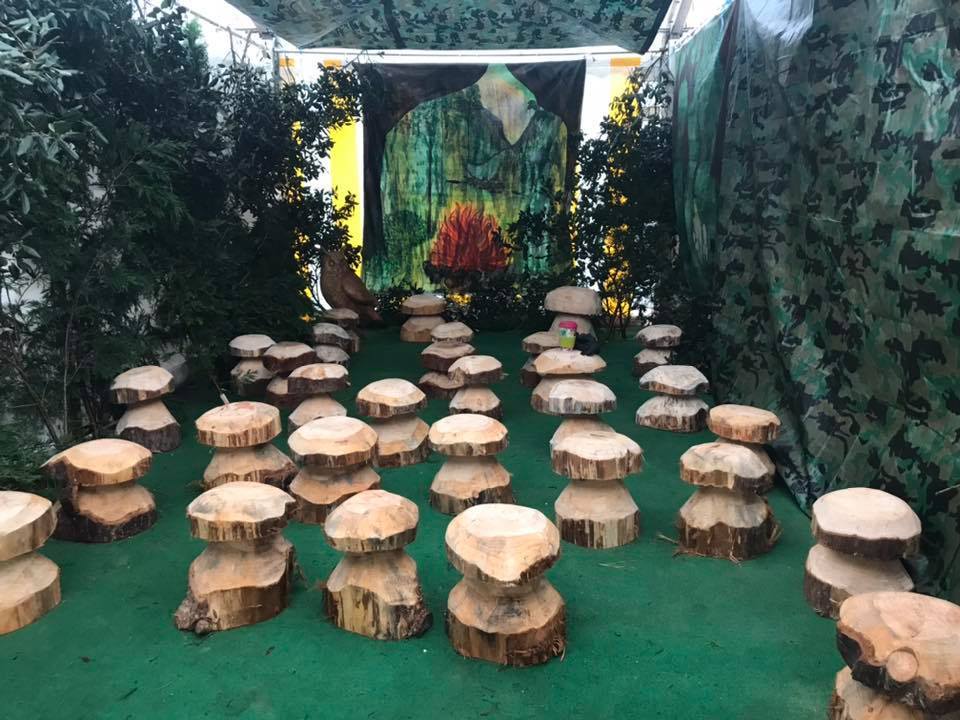Somewhere only we know: Why children need a place of their own

Do you remember being lost in imaginative play when you were a child? Living in a dream scenario that you, and perhaps your friends, had built together?
Den building is an age-old pastime that is still just as pertinent to a child’s development today as it ever was. Den building often takes place outdoors, allowing children to flex their creativity, imagination, and problem-solving skills alongside a healthy dose of fresh air, sunlight, and physical activity.
In this blog, we’ll explore just why den building is so enriching for children and how you as a parent, guardian, or caregiver can enable and encourage den building and the lessons present therein.
The benefits of outdoor play
Being outside is a natural creative prompt. Think about it; all of the materials to hand in inside environments are either man-made or artificially inserted into the environment. Outside, children can lay their hands on sticks, stones, leaves, and flowers – the perfect objects to stimulate their creativity, and help them learn to manipulate and experiment with the environment around them.
The natural environment also throws up ideal ‘playgrounds’ for children, with uneven floors to balance on, branches and rocks to climb and hollows to hide in. All of these elements combine to create such a positive force in encouraging creative, challenging, and imaginative play.
Socially, the outside world also creates positive development opportunities. Because the children are likely ‘building’ their fun themselves, the environment provides the opportunity to work as a team and provokes negotiation, cooperation, and problem-solving. Children learn from their mistakes and may become open to the suggestions of others.
Outdoor play encourages:
- Physical fitness, stamina, and agility through running and chasing.
- Increased bone density, muscle growth, and stability through jumping and running.
- Coordination, balance, and strength through climbing and balancing.
- Stress-relief, as outdoors is an appropriate environment for shouting, screaming, whooping, and ‘letting off steam’.
- Time away from timetables and routines.
- Healthy eyes, as outdoor time helps to reduce myopia (short-sightedness).
The benefits of den building
Den building as an activity provokes all sorts of learning environments, as mentioned above. Below, we’ll outline some of the most pertinent benefits of den building for childhood development.
Risk assessment
Outdoor play poses different risks to indoor play. Contrary to what we all might think, though, indoors isn’t necessarily ‘safer’ – the outdoors just cannot as easily be controlled as indoor spaces. (VERY low level!) danger helps children to learn how to take healthy risks, set their own boundaries, and moderate their own behaviours. Adjusting to uncertainty and change, too, is part and parcel of growing up, so the way that outdoor environments are unpredictable helps in this regard. Calibrating risk levels for themselves, and understanding how to calculate risk levels, is a crucial way to help children moderate their risk-taking behaviours and makes them less likely to put themselves in harm’s way in the long run. Den building naturally proffers up this element of risk, as they erect structures, learning about their own strength (and about gravity!) along the way.
Planning and problem solving
Den building is basic level engineering! It makes the child consider construction, and forward-planning, to create a structure that stays upright. It also encourages the ‘try, try again’ mentality as they learn from previous attempts. The planning and problem-solving processes also encourage teamwork, as all children involved try to improve the structure.
A mental health haven
We live in a world where childhood is very much a structured, routine-driven entity, with lots of hoops to jump and hurdles to leap. We sometimes forget that social development is also key to a healthy, happy future, and den-building offers the perfect opportunity for interaction with their peers. The finished structure also provides a child-run, child-controlled social environment, where children can feel empowered and make their own decisions. A permanent den structure can even turn into a child-run meeting place. Den building can be a chance for children to escape the curriculum, competition, and time pressures, and to decompress. Removing the pressures of everyday life is particularly pertinent for children with very hectic, and even dysfunctional lives.
Social Interaction
Social interaction between kids is vital. Dens also provide an opportunity to develop a sense of self, as highlighted by UK, Scandinavian and American research. This ‘home away from home’ is a child’s chance to project their image of themself onto their environment, and ‘govern’ their space. This secret, special spot creates a real sense of adventure, privacy, and independence. It is an environment that is secure, but which they are allowed to visit unaccompanied. They create their own rules. This is an environment in which children can teach themselves on the journey to adulthood; an environment where language, social development, problem-solving, mathematical learning, and physical development are constant features.
As children grow, their den-building dreams often become more aspirational. At this point, an older friend or family member is often roped in – be that a parent, family friend, or grandparent. This is a great opportunity to offer an informal teaching environment, as the older educator shows them, for example, how to cut and transport their logs.
Teamwork
Part and parcel of social interaction, the children will learn teamwork when constructing a den with other children. Because they have to satisfy all of their plans, and also because everyone will want to contribute, compromises will have to be made. They will have to make the den a certain height (only as tall as the shortest can reach) and from certain materials (nothing heavier than the weakest can carry, unless they split their roles). They learn the value of community, individual and group strengths, and how to take into account the needs of others. It’s also a great opportunity for children to learn skills from one another, and build their sense of self, as leaders or as team players. The sense of achievement that they shoulder and share when the den is complete is also a great way to experience the results of hard work.
Creative inspiration
Den building requires children to express themselves creatively and practically, building things they haven’t before (and problem-solving when things go wrong). Imagination is a key ingredient in any den – the den might be a far-flung Scottish castle, a war-time submarine, a desert island, a pirate’s ship, or a scene from their favourite book or TV show. Whatever it is, they are building it creatively and sharing this vision with any other participants. Den building also requires children to be open to suggestions, and to fixing their mistakes, in a constructive way. They learn to plan before they build, and discover flaws in their plans when they build, which they need to remedy – going round and round until their den is how they wish it to be. They also learn some different routes to empathy through acting out different characters – whether they are the shopkeeper, a hero, or a pirate, they will be putting themselves into the shoes of others and interacting with their friends in this imaginative game of give and take.
Developing language
Instructions need to be shared in an understandable and concise manner when den building and problem-solving discussions will need to take place. Language development isn’t the first skill you might associate with den building, but it’s certainly a critical feature. Plenty of chatter will happen during the planning and construction process, which often breeds an open environment for easy chatter when the den is complete. The absence of parental control also allows for open dialogue amongst children, and the completed den’s ability to be imaginatively transformed into any environment they dream up creates an atmosphere that they literally create through dialogue with one another. Imaginary play kicks up a wonderful opportunity for utilising rich language.
Mathematical skills
Working with figures consciously or subconsciously is a crucial facet of den building. Being able to visualise the final product helps children to complete the build process successfully, and getting these designs on paper usually requires some utilisation of maths skills. They need to think logically about their materials – is that too heavy for a roof, or too light for a wall strut? They will consider shape, size, and strength, and learn from their choices. Something too big might be hard to use and hard to balance, whilst something small might not support the structure. This is mathematical learning at its best, as children put their hands on materials and constantly learn, putting them together and taking them apart, until they have what they desire.
Physical development
Children used to spend a lot more time outdoors, in den environments. Nowadays parents are less inclined to grant children alone time outdoors, they have less free time so want to spend it together, and the call of electronic devices keeps children inside. That means they are missing the sometimes vigorous activity that den building can require – the sort of activity the children themselves don’t even notice, but you’ll notice when they crash into bed that evening! They will be stretching, balancing, and transporting the construction objects for their dens, back and forth. Expect balance, dexterity, and strength to all improve as a result.
Perseverance
It’s easy to give up when you’re little and a parent is impatiently watching you try to complete a task. The den building environment puts them in control of the process, allowing non-judgmental space to fail and learn. This ability to persevere and be determined is a brilliant lesson for life, and one learned subliminally, as the children are absorbed in the den-making process rather than their repeated failures or miscalculations. This level of determination is a life skill that can then be applied to almost all other forms of learning.
The practical application of maths, physics, engineering, and creativity is a wonderful outcome of the den building process. These valuable skills can be imposed onto all aspects of life, and other learning environments, too!
Landscapes 4 Learning is a leading expert in providing affordable, durable outdoor learning equipment for children, to help inspire and nurture young people through play.
